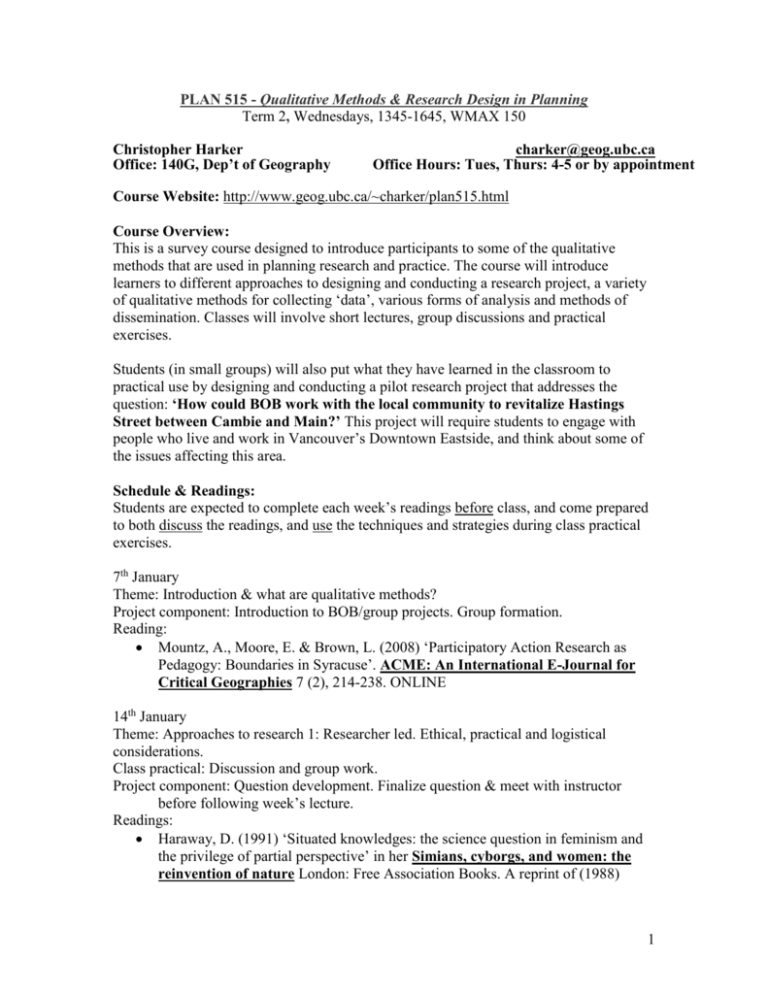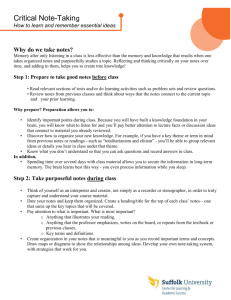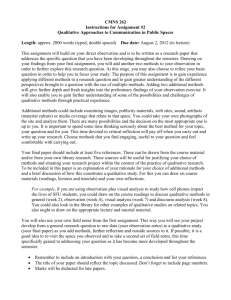Course Outline
advertisement

PLAN 515 - Qualitative Methods & Research Design in Planning Term 2, Wednesdays, 1345-1645, WMAX 150 Christopher Harker Office: 140G, Dep’t of Geography charker@geog.ubc.ca Office Hours: Tues, Thurs: 4-5 or by appointment Course Website: http://www.geog.ubc.ca/~charker/plan515.html Course Overview: This is a survey course designed to introduce participants to some of the qualitative methods that are used in planning research and practice. The course will introduce learners to different approaches to designing and conducting a research project, a variety of qualitative methods for collecting ‘data’, various forms of analysis and methods of dissemination. Classes will involve short lectures, group discussions and practical exercises. Students (in small groups) will also put what they have learned in the classroom to practical use by designing and conducting a pilot research project that addresses the question: ‘How could BOB work with the local community to revitalize Hastings Street between Cambie and Main?’ This project will require students to engage with people who live and work in Vancouver’s Downtown Eastside, and think about some of the issues affecting this area. Schedule & Readings: Students are expected to complete each week’s readings before class, and come prepared to both discuss the readings, and use the techniques and strategies during class practical exercises. 7th January Theme: Introduction & what are qualitative methods? Project component: Introduction to BOB/group projects. Group formation. Reading: Mountz, A., Moore, E. & Brown, L. (2008) ‘Participatory Action Research as Pedagogy: Boundaries in Syracuse’. ACME: An International E-Journal for Critical Geographies 7 (2), 214-238. ONLINE 14th January Theme: Approaches to research 1: Researcher led. Ethical, practical and logistical considerations. Class practical: Discussion and group work. Project component: Question development. Finalize question & meet with instructor before following week’s lecture. Readings: Haraway, D. (1991) ‘Situated knowledges: the science question in feminism and the privilege of partial perspective’ in her Simians, cyborgs, and women: the reinvention of nature London: Free Association Books. A reprint of (1988) 1 ‘Situated knowledges: the science question in feminism as a site of discourse on the privilege of partial perspective’ Feminist Studies 14(3): 575-599. ONLINE Deutsch, Nancy. (2004) “Positionality and the Pen: Reflections on the Process of Becoming a Feminist Researcher and Writer,” Qualitative Inquiry 10 (6): 885902. ONLINE Wiles, R., V. Charles, G. Crow and S. Heath. (2006) “Researching researchers: lessons for research ethics” Qualitative Research 6: 283-299 (Aug). ONLINE TCPS tutorial. http://www.pre.ethics.gc.ca/english/tutorial/ (no need to log in). 21st January Theme: Approaches to research 2: Case Studies Class practical: Ethics forms. Project component: Begin literature review. Begin to plan project: contact BOB and/or other groups. Readings: Flyvbjerg, B. (2006) “Five Misunderstandings About Case-Study Research” Qualitative Inquiry 12(2): 219 - 245. ONLINE VanWynsberghe, R. and S. Khan. (2007) “Case Study: A Re-Definition” International Journal of Qualitative Methods 6(2): 80-94. ONLINE 28th January Theme: Approaches to research 3: Participatory Action Research Class practical: Discussion with Prof. Geraldine Pratt. Project component: Discuss/share literature (in class). Readings: Amsden, J. and R. VanWynsberghe. (2005) “Community mapping as a research tool with youth” Action Research 3(4): 357-381. ONLINE Pratt, G. and Kirby, E. (2003) ‘Performing Nursing: BC Nurses’ Union Theatre Project’ ACME: An International E-Journal for Critical Geographies 2 (1): 14-32. ONLINE Pratt, G. in collaboration with the Philippine Women Centre of B.C. and Ugnayan ng Kabataang Pilipino sa Canada/Filipino-Canadian Youth Alliance (2007) “Working with Migrant Communities: Collaborating with the Kalayaan Centre in Vancouver, Canada” in Participatory Action Research Approaches and Methods: Connecting People, Participation and Place (Eds. Sara Kindon, Rachel Pain and Mike Kesby) Routledge, London,95-103. 4th February Theme: Approaches to research 4: Evaluation Research Class Practical: Evaluation exercise and discussion. Project component: Lit. review deadline. Readings: Babbie, E. and Benaquisto, L. (2002) ‘Chapter 13: Evaluation Research’ in their Fundamentals of Social Research. Scarborough: Thomson/Nelson. Newburn, Tim (2001) ‘What do we mean by evaluation?’ Children & Society 15 (1) 5-13. ONLINE 2 Shaw, Ian 2003 ‘Qualitative research and outcomes in health, social work and education’ Qualitative Research 3: 57 - 77. ONLINE 11th February Theme: Talking to people: interviews, focus groups, life histories Class Practical: Interviews and focus group exercises. Project component: Methodology and project set-up continues. Readings: McCoyd J L M and Schwaber Kerson T (2006) Conducting intensive interviews using email: a serendipitous comparative opportunity Qualitative Social Work 5: 389–406. ONLINE Hermanowicz, J. (2002) ‘The great interview: 25 strategies for studying people in bed.’ Qualitative Sociology 25(4): 479 – 499. ONLINE Hurray! It’s the… MID TERM BREAK 25th February Theme: Do it yourself: participant observation, observant participation, ethnography. Class Practical: Ethnography exercise and discussion. Project component: Finalise methodology and project set-up. Readings: Cerwonka, A. & Malkki, L. (2007) Improvising Theory Chicago: University of Chicago Press. p1-40, 162-187. Stack, Carol. (1997) “Beyond What Are Givens as Givens: Ethnography and Critical Policy Studies.” Ethos 25(2): 191-207. ONLINE 4th March Theme: Expanding your repertoire: performance methods, (documentary) video, methods for working with children, physically & mentally less able. Class Practical: Performance exercise with Caleb Johnston. Project component: Methodology assignment deadline. Research period begins. Readings: Sandercock, L., Attili, G., Sarkissian, W., Frantz, J., Tewder-Jones, M., Gurstein, P. 2007. ‘INTERFACE: Multimedia and Planning’ Planning Theory and Practice 8 (1) 89-114. ONLINE Langevang, Thilde (2007) ‘Movements in Time and Space: Using Multiple Methods in Research with Young People in Accra, Ghana’ Children’s Geographies 5(3) 267-281. ONLINE Tregaskis C and Goodley D (2005) Disability research by disabled and nondisabled people: towards a relational methodology of research production International Journal of Social Research Methodology 8: 363–74. ONLINE 11th March Theme: The world as text: archival research, content and discourse analysis Class Practical: Content and/or discourse analysis exercise and discussion. Project component: Research week 2 3 Readings: Rose, G. (2001) ‘Chapter 6: Discourse Analysis I: text, intertextuality, context’ & ‘Chapter 7: Discourse Analysis II: institutions and ways of seeing’ in her Visual Methodologies. Thousand Oaks (CA): Sage. 18th March Theme: The world as text 2: coding, theme building and computer software. Class Practical: Atlas.ti exercise with Cameron Owens Project component: Research week 3. Finish research. Start analysis. Readings: Bird, C. (2005) ‘How I stopped dreading and learned to love transcription’ Qualitative Inquiry 11 (2): 226-248. ONLINE St John, W. & Johnson, P. (2000) ‘The Pros and Cons of Data Analysis Software for Qualitative Research’. Journal of Nursing Scholarship 32 (4): 393-397. ONLINE 25th March Theme: Writing/Presenting/Disseminating research Class Practical: project work Project component: continue analysis. Analysis deadline. Readings: Bradford, M. (2003) ‘Writing Essays, Reports and Dissertations’ in Clifford, N. & G. Valentine (eds.) Key Methods in Geography. Thousand Oaks (CA): Sage. Gurstein, P. (forthcoming) ‘Seeing and Being Seen: The Potential of Multimedia as a Reflexive Planning Methodology’ in Sandercock, L. & G. Attili (eds.) Multimedia and Planning: An exploration of the next frontier. New York: Springer Publishing Co. FROM INSTRUCTOR. 1st April Theme: Research Presentations 1 8th April Theme: Research Presentations 2 Evaluation: Class participation Literature review Methodology Analysis Presentation 25% 20% 15% 10% 30% Assignments: Literature Review 4 The main idea of a literature review is to show how your research fits into what has been done before and why your study needs to be done. A good review: i) ii) iii) iv) synthesizes and evaluates the previous literature delineates the known from the unknown develops a line of argument lays the groundwork for the study or analysis to come Consider the following questions: What is the present state of knowledge in this general area (i.e. the area pertaining to your proposed area)? What have previous studies found? Have earlier studies fallen short? Where does your study fit in? Where (how) does your study fill a gap in the literature or perform research that previously has not been done? In answering these questions, you must stick very closely to and work with the existing literature. You should outline your argument through a discussion of what has already been written. Methodology The description of proposed methodology will vary, depending on your research question and chosen method(s). The purpose of the description is to identify data sources, variables of interest, methods for measuring and/or interpreting them and sampling strategies. You should also identify the logistical and ethical questions that your research may encounter. The methodology section will be assessed in terms of how well the described methodology allows you to address your research question, and how thoroughly you describe the proposed methodology. Analysis This section of your project should outline how you analysed the data you collected, what results your analysis generated with regards to your research question, and what were the limitations of your empirical research? You may also wish to consider how you might conduct the research differently in future? Presentation & Recommendations for Action Each group will give a 20 minute presentation on their research. The presentations should outline what question was asked, what work has been done on this topic prior to this project, what methods were used, some analysis of the ‘data’, and how the group would move forward with the project. There will then be 40 minutes for questions and discussion around project design/collaboration/developing the research. 5







